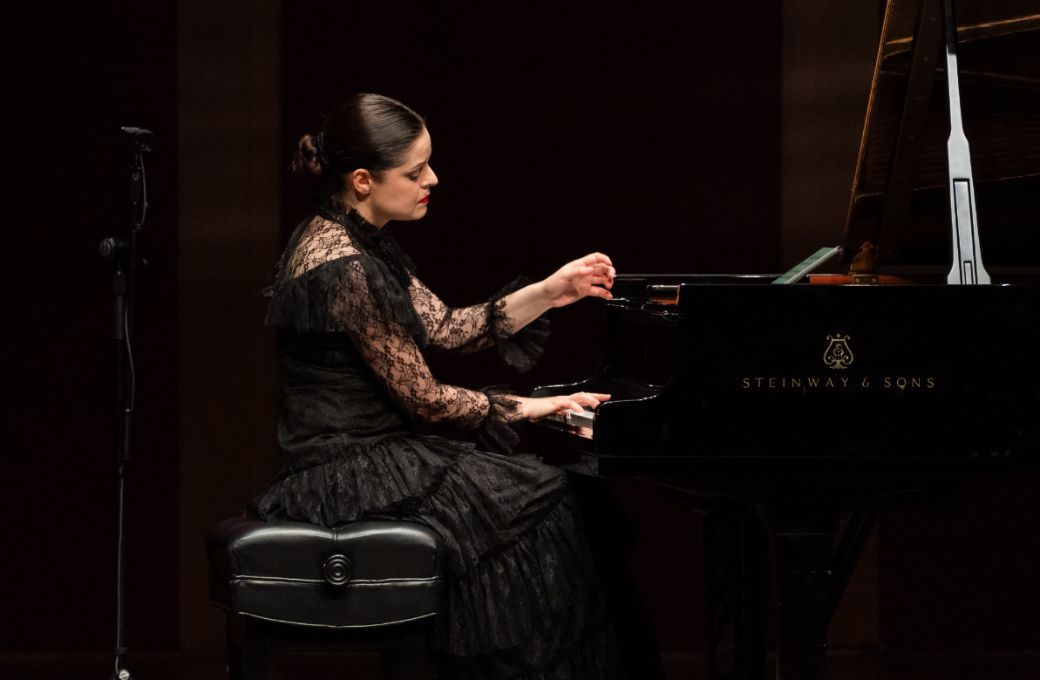On an evening with multiple concerts going on in Singapore, Russian pianist Zlata Chochieva, presented by Altenburg Arts, attracted a modest but discerning audience. Recital programming matters too. Schumann and Prokofiev, like chalk and cheese, did not strike one as immediately appealing on paper but the reality proved otherwise. Her recital opened with a Sonata in C minor by little-known Venetian Baroque composer Giovanni Battista Pescetti (1704-1766). Originally conceived for harpsichord, Chochieva coaxed a luscious and velvety sonority on the modern grand piano with deft and sensitive pedalling. Its three short movements were binary (each with two halves) in form, playing and sounding like a sequence of Domenico Scarlatti sonatas.

Dance-like in feel, this was the perfect appetiser for Schumann’s Davidsbündlertänze, a succession of 18 short character studies. The German composer’s imaginary League of David, which this work celebrates, represented the ideals of contemporary composition that he dearly espoused. Among the characters were the conflicting alter egos Florestan and Eusebius, reflecting the extroverted and introverted sides to his personality.
The first movement, a boisterous yet beguiling mazurka, had both the imprimaturs of Florestan and Eusebius, while the hauntingly beautiful second movement (marked Innig or intimately) was wholly Eusebius. Chochieva weathered the movements’ many dynamic shifts with much aplomb, overcoming treacherous challenges in the fast Florestan movements and finding poetry in retiring the Eusebius movements. This was an absorbing reading from start to finish. Particularly striking was the penultimate movement, with a reminiscence of that earlier Innigkeit – revealing nostalgia in its truest sense – before dissolving into a sublime slow final waltz. Eusebius wins.
The entire second half was devoted to Sergei Prokofiev, revealed by Chochieva as a Romantic at heart. Three Pieces (Op.95) from the ballet Cinderella – a pavane, a gavotte and a slow waltz – had lyricism at their core, with subtly applied orchestral textures around the melodies. These were palate-cleansers before the onslaught of his Piano Sonata no. 6 in A major, the first of his ‘War’ trilogy. The opening movement is distinguished by its pummelling brutality, and Chochieva amply delivered col pugno by the fistful, but her musical sensibilities were never found wanting. The middle movements were dances, the first angular and grotesque but infused with ironic humour, while the second was a slow waltz with a troubled Romanticism mirroring the preceding dances from Cinderella. Machine-gun brilliance lit up the finale, with a resumption of earlier hostilities. Chochieva’s keen and incisive finger-work, unlike General Chuikov’s Soviet army at Stalingrad (the sonata’s occasional nickname), took no prisoners.
Her encores were also tantalisingly varied. The quick fire of Rachmaninov’s Etude-tableaux in A minor (Op.39 No.6), sometimes called “Little Red Riding Hood”, contrasted with the bluesy elegance of Soviet era Ukrainian jazz composer Alexander Tsfasman’s slow foxtrot Stay With Me. Chochieva’s fine recital was certainly one to remember.


